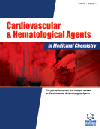-
s The Cardiovascular Protective Effects of Chrysin: A Narrative Review on Experimental Researches
- Source: Cardiovascular & Hematological Agents in Medicinal Chemistry, Volume 17, Issue 1, May 2019, p. 17 - 27
-
- 01 May 2019
Abstract
Chrysin is one of the flavonoids fruits, vegetables, and plant especially found in honey, it has been indicated that its cardiovascular protective effect is due to its antioxidative effects and antiinflammatory activities. Chrysin exerts an antioxidant effect by enhancing the antioxidant system, suppressing pro-oxidant enzymes, scavenging free radicals and chelating redox active transitionmetal ions. Chrysin decreases lipid synthesis and also increases its metabolism, thereby ameliorating blood lipid profile. Chrysin modulates vascular function by increasing the bioavailability of endothelial nitric oxide. Chrysin inhibits the development of atherosclerosis by decreasing vascular inflammation. The anti-inflammatory effects of chrysin may relate to its inhibitory effect on the nuclear transcriptional factor-kB signaling pathway. It also prevents vascular smooth muscle cells proliferation and thrombogenesis. Altogether, chrysin may be effective as a natural agent for the prevention and treatment of cardiovascular diseases; however, several clinical trial studies should be done to confirm its protective effects on humans.


